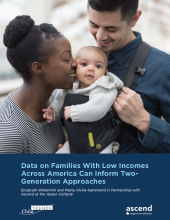0
Publication
Community:
Jan 18, 2024
Marjorie Sims, Sarah Haight
January 2024
Focused on the 23,306 young parents (ages 18 to 24) and their families in New Mexico, this report provides a framework for organizations in New Mexico to collaborate more effectively and offers a plan of action to assess these efforts and strengthen impact for families.
This publication aims to deepen understanding about the demographics, aspirations, and needs of young parents; highlights practices and policies aligned with a two-generation (2Gen) approach; showcases opportunities to streamline this work by forging connections between organizations and state systems; and offers recommendations across sectors and at all levels.
Suggested Reference: Suggested Reference: Sims, M. & Haight, S. (2024). Meeting Young Parents Where They Dream: A Collaborative Framework for a 2Gen Approach in New Mexico. Washington, DC.
Authored by: Marjorie Sims, Sarah Haight
Topics: Child welfare, Dual-generation, dual-generation initiative, Early childhood, Family engagement, Healthy homes, Housing
 Shared by Molli Caite Hughes
Shared by Molli Caite Hughes
Molli Caite Hughes posted a
on Jan 18, 2024
Marjorie Sims, Sarah Haight
Marjorie Sims, Sarah Haight
January 2024
Focused on the 23,306 young parents (ages 18 to 24) and their families in New Mexico, this report provides a framework for organizations in New Mexico to collaborate more effectively and offers a plan of action to assess these efforts and strengthen impact
0
Report
Community:
Mar 1, 2023

We are delighted to share a new research report in partnership with Child Trends: Data on Families with Low Incomes Across America Can Inform Two-Generation Approaches. In this new analysis, research experts Elizabeth Wildsmith and Marta Alvira-Hammond paint a detailed picture of how families in households with low incomes in the United States have changed since 2011. The report highlights 10 key findings from their analyses of family economic and social conditions related to financial security and mobility, family structure and living arrangements, education and employment, parental health, and community health indicators (for example, rates of child poverty, violent crime, child care costs). A deeper understanding of families with low-incomes will inform our collective work and strengthen how our 2Gen policy and practice recommendations can prioritize health, education, employment, and economic assets to ensure families have access to the resources they need to build intergenerational prosperity and well-being.
Authored by: Elizabeth Wildsmith and Marta Alvira-Hammond for Child Trends in partnership with Ascend at the Aspen Institute
Topics: dual-generation initiative, Early childhood, Education, Health, Housing, Legislation & Policy, Low-income, Racial inequalities
 Shared by Sandra Ware
Shared by Sandra Ware
Sandra Ware posted a
on Mar 2, 2023
Elizabeth Wildsmith and Marta Alvira-Hammond for Child Trends in partnership with Ascend at the Aspen Institute
We are delighted to share a new research report in partnership with Child Trends: Data on Families with Low Incomes Across America Can Inform Two-Generation Approaches.
0
Case study
Community:
Oct 25, 2022
According to UN-Habitat, the world needs to build 96,000 affordable homes every day to address the
global housing crisis by 2030. Yet, better utilizing existing housing stock—through options such as shared
housing—can make a significant dent in the need to build more housing. With college students often
challenged to find affordable housing and many older adults living alone in homes with spare bedrooms,
these two groups are increasingly benefitting from living together. Universities are often well-suited to
facilitate students living and learning with older adults in nearby communities. Intentionally fostering
intergenerational engagement through places and programs can reduce loneliness, mitigate ageist
stereotypes, and help both groups to thrive.
Authored by: Stephanie Firestone and Julia Glassman for AARP Equity by Design
Topics: Community development, dual-generation initiative, Funding, Health, Homelessness, Housing, Mental health, Seniors, Youth
 Shared by Sandra Ware
Shared by Sandra Ware
Sandra Ware posted a
on Oct 25, 2022
Stephanie Firestone and Julia Glassman for AARP Equity by Design
According to UN-Habitat, the world needs to build 96,000 affordable homes every day to address the
global housing crisis by 2030. Yet, better utilizing existing housing stock—through options such as shared
housing—can make a significant dent in the need to build more housing.
 Shared by Molli Caite Hughes
on Jan 18, 2024
Shared by Molli Caite Hughes
on Jan 18, 2024

 Shared by Sandra Ware
on Mar 2, 2023
Shared by Sandra Ware
on Mar 2, 2023

 Shared by Sandra Ware
on Oct 25, 2022
Shared by Sandra Ware
on Oct 25, 2022



